Reflection at an incident of care home
VerifiedAdded on 2023/06/03
|9
|2205
|136
AI Summary
This nursing reflective essay evaluates an incident at a care home involving an old patient with dementia. The essay uses Gibbs reflection model to describe the incident, analyze feelings, evaluate the situation, and develop an action plan. The essay highlights the importance of proper nursing practices and care for dementia patients.
Contribute Materials
Your contribution can guide someone’s learning journey. Share your
documents today.
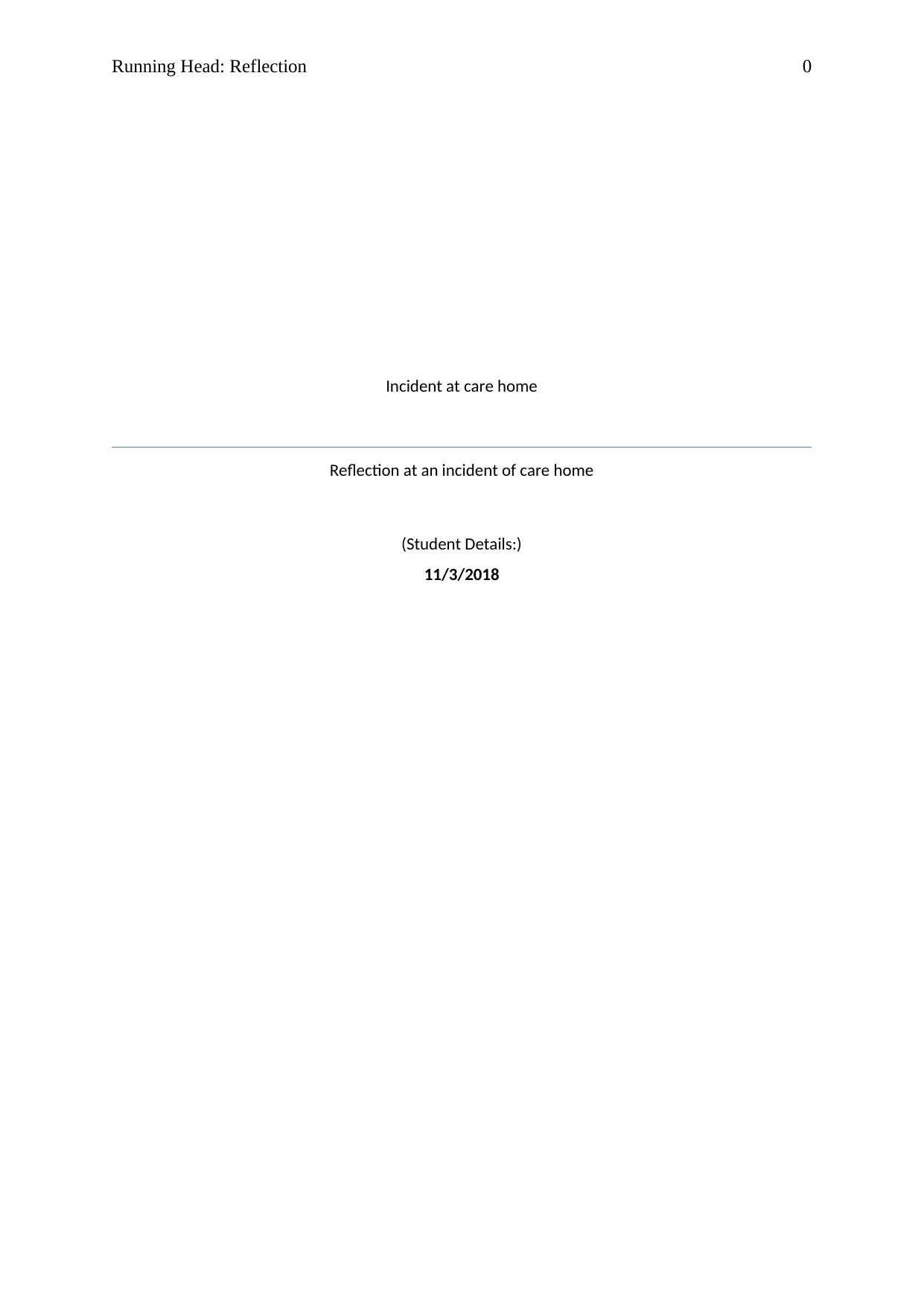
Running Head: Reflection 0
Incident at care home
Reflection at an incident of care home
(Student Details:)
11/3/2018
Incident at care home
Reflection at an incident of care home
(Student Details:)
11/3/2018
Secure Best Marks with AI Grader
Need help grading? Try our AI Grader for instant feedback on your assignments.
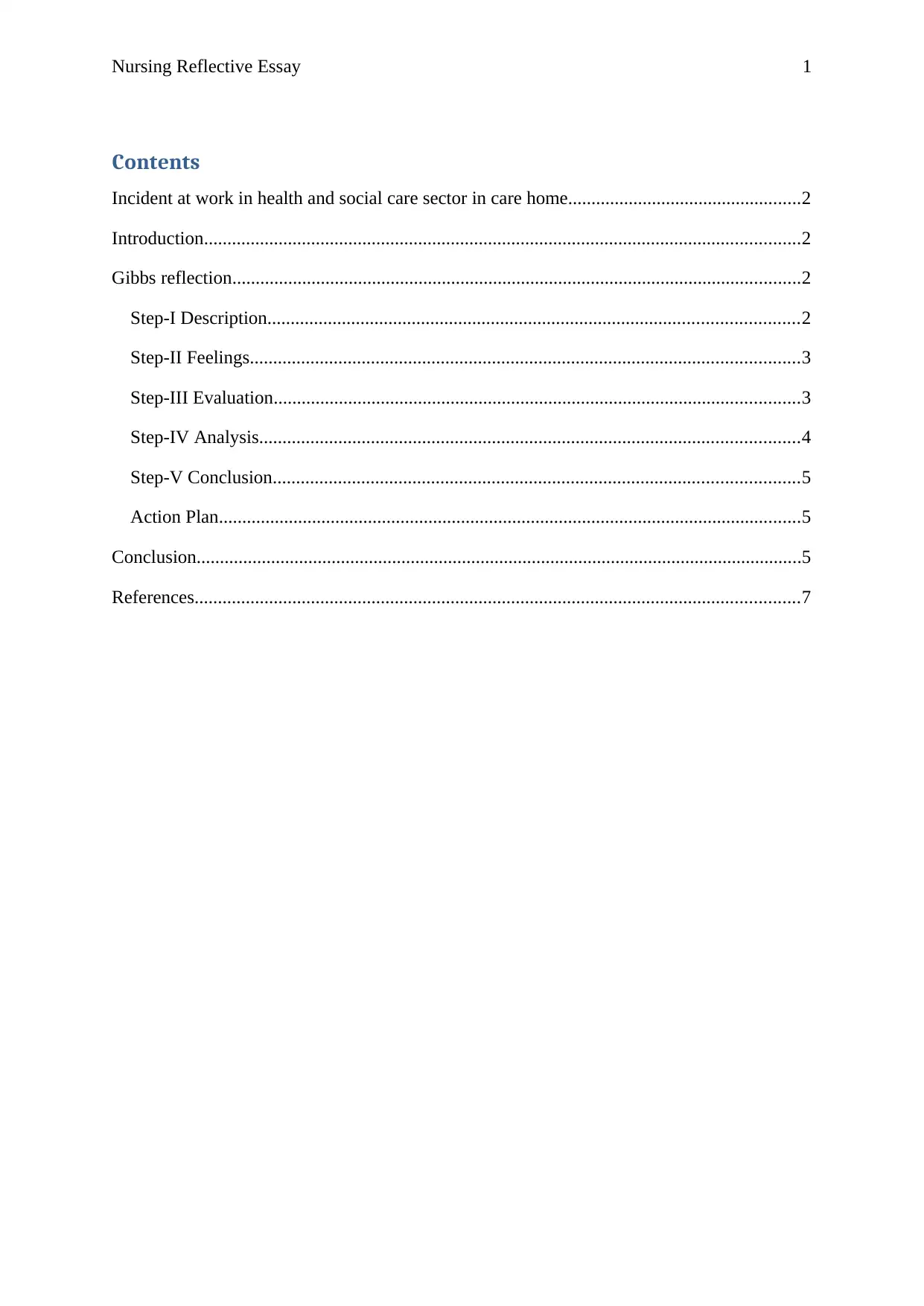
Nursing Reflective Essay 1
Contents
Incident at work in health and social care sector in care home..................................................2
Introduction................................................................................................................................2
Gibbs reflection..........................................................................................................................2
Step-I Description..................................................................................................................2
Step-II Feelings......................................................................................................................3
Step-III Evaluation.................................................................................................................3
Step-IV Analysis....................................................................................................................4
Step-V Conclusion.................................................................................................................5
Action Plan.............................................................................................................................5
Conclusion..................................................................................................................................5
References..................................................................................................................................7
Contents
Incident at work in health and social care sector in care home..................................................2
Introduction................................................................................................................................2
Gibbs reflection..........................................................................................................................2
Step-I Description..................................................................................................................2
Step-II Feelings......................................................................................................................3
Step-III Evaluation.................................................................................................................3
Step-IV Analysis....................................................................................................................4
Step-V Conclusion.................................................................................................................5
Action Plan.............................................................................................................................5
Conclusion..................................................................................................................................5
References..................................................................................................................................7
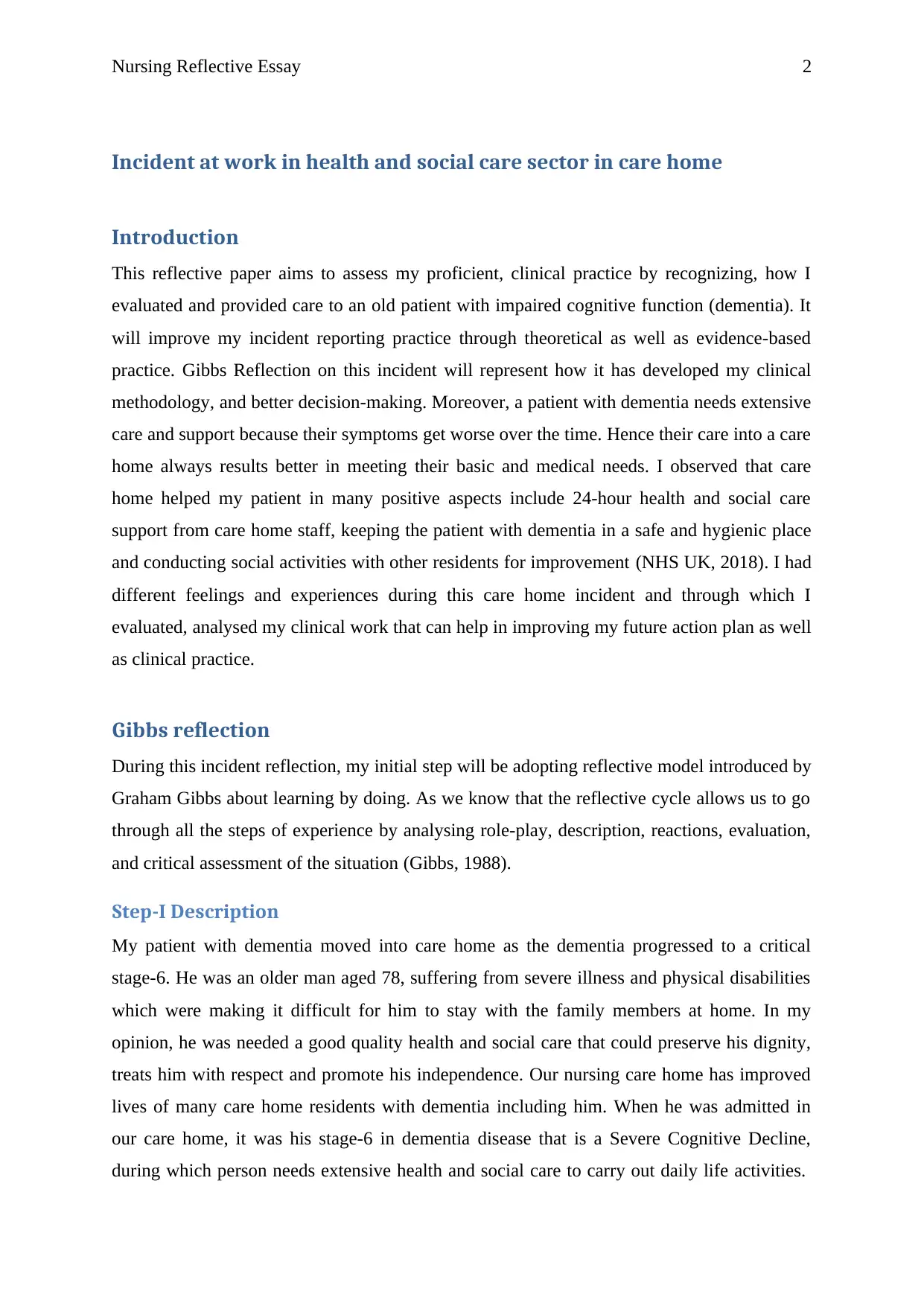
Nursing Reflective Essay 2
Incident at work in health and social care sector in care home
Introduction
This reflective paper aims to assess my proficient, clinical practice by recognizing, how I
evaluated and provided care to an old patient with impaired cognitive function (dementia). It
will improve my incident reporting practice through theoretical as well as evidence-based
practice. Gibbs Reflection on this incident will represent how it has developed my clinical
methodology, and better decision-making. Moreover, a patient with dementia needs extensive
care and support because their symptoms get worse over the time. Hence their care into a care
home always results better in meeting their basic and medical needs. I observed that care
home helped my patient in many positive aspects include 24-hour health and social care
support from care home staff, keeping the patient with dementia in a safe and hygienic place
and conducting social activities with other residents for improvement (NHS UK, 2018). I had
different feelings and experiences during this care home incident and through which I
evaluated, analysed my clinical work that can help in improving my future action plan as well
as clinical practice.
Gibbs reflection
During this incident reflection, my initial step will be adopting reflective model introduced by
Graham Gibbs about learning by doing. As we know that the reflective cycle allows us to go
through all the steps of experience by analysing role-play, description, reactions, evaluation,
and critical assessment of the situation (Gibbs, 1988).
Step-I Description
My patient with dementia moved into care home as the dementia progressed to a critical
stage-6. He was an older man aged 78, suffering from severe illness and physical disabilities
which were making it difficult for him to stay with the family members at home. In my
opinion, he was needed a good quality health and social care that could preserve his dignity,
treats him with respect and promote his independence. Our nursing care home has improved
lives of many care home residents with dementia including him. When he was admitted in
our care home, it was his stage-6 in dementia disease that is a Severe Cognitive Decline,
during which person needs extensive health and social care to carry out daily life activities.
Incident at work in health and social care sector in care home
Introduction
This reflective paper aims to assess my proficient, clinical practice by recognizing, how I
evaluated and provided care to an old patient with impaired cognitive function (dementia). It
will improve my incident reporting practice through theoretical as well as evidence-based
practice. Gibbs Reflection on this incident will represent how it has developed my clinical
methodology, and better decision-making. Moreover, a patient with dementia needs extensive
care and support because their symptoms get worse over the time. Hence their care into a care
home always results better in meeting their basic and medical needs. I observed that care
home helped my patient in many positive aspects include 24-hour health and social care
support from care home staff, keeping the patient with dementia in a safe and hygienic place
and conducting social activities with other residents for improvement (NHS UK, 2018). I had
different feelings and experiences during this care home incident and through which I
evaluated, analysed my clinical work that can help in improving my future action plan as well
as clinical practice.
Gibbs reflection
During this incident reflection, my initial step will be adopting reflective model introduced by
Graham Gibbs about learning by doing. As we know that the reflective cycle allows us to go
through all the steps of experience by analysing role-play, description, reactions, evaluation,
and critical assessment of the situation (Gibbs, 1988).
Step-I Description
My patient with dementia moved into care home as the dementia progressed to a critical
stage-6. He was an older man aged 78, suffering from severe illness and physical disabilities
which were making it difficult for him to stay with the family members at home. In my
opinion, he was needed a good quality health and social care that could preserve his dignity,
treats him with respect and promote his independence. Our nursing care home has improved
lives of many care home residents with dementia including him. When he was admitted in
our care home, it was his stage-6 in dementia disease that is a Severe Cognitive Decline,
during which person needs extensive health and social care to carry out daily life activities.
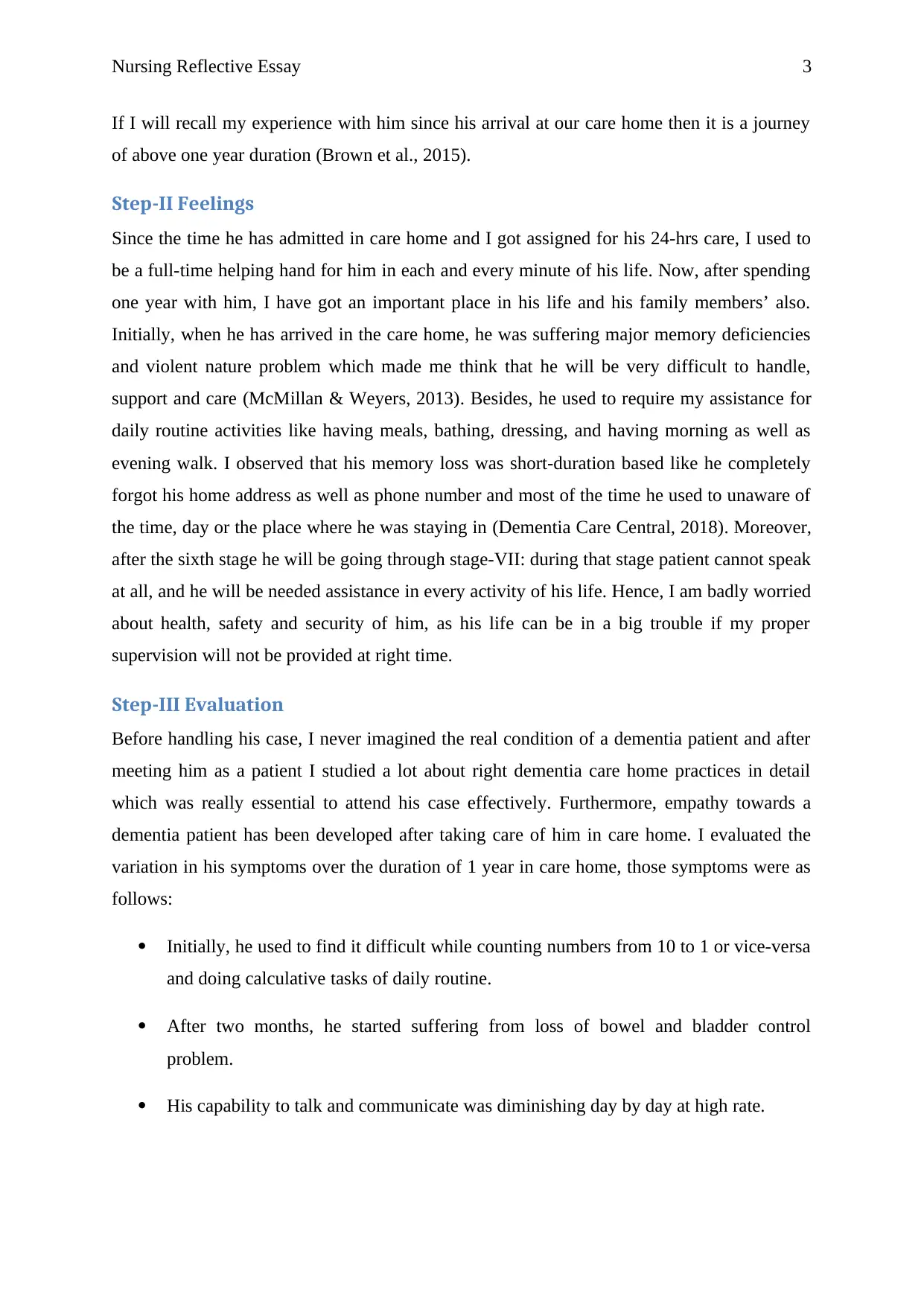
Nursing Reflective Essay 3
If I will recall my experience with him since his arrival at our care home then it is a journey
of above one year duration (Brown et al., 2015).
Step-II Feelings
Since the time he has admitted in care home and I got assigned for his 24-hrs care, I used to
be a full-time helping hand for him in each and every minute of his life. Now, after spending
one year with him, I have got an important place in his life and his family members’ also.
Initially, when he has arrived in the care home, he was suffering major memory deficiencies
and violent nature problem which made me think that he will be very difficult to handle,
support and care (McMillan & Weyers, 2013). Besides, he used to require my assistance for
daily routine activities like having meals, bathing, dressing, and having morning as well as
evening walk. I observed that his memory loss was short-duration based like he completely
forgot his home address as well as phone number and most of the time he used to unaware of
the time, day or the place where he was staying in (Dementia Care Central, 2018). Moreover,
after the sixth stage he will be going through stage-VII: during that stage patient cannot speak
at all, and he will be needed assistance in every activity of his life. Hence, I am badly worried
about health, safety and security of him, as his life can be in a big trouble if my proper
supervision will not be provided at right time.
Step-III Evaluation
Before handling his case, I never imagined the real condition of a dementia patient and after
meeting him as a patient I studied a lot about right dementia care home practices in detail
which was really essential to attend his case effectively. Furthermore, empathy towards a
dementia patient has been developed after taking care of him in care home. I evaluated the
variation in his symptoms over the duration of 1 year in care home, those symptoms were as
follows:
Initially, he used to find it difficult while counting numbers from 10 to 1 or vice-versa
and doing calculative tasks of daily routine.
After two months, he started suffering from loss of bowel and bladder control
problem.
His capability to talk and communicate was diminishing day by day at high rate.
If I will recall my experience with him since his arrival at our care home then it is a journey
of above one year duration (Brown et al., 2015).
Step-II Feelings
Since the time he has admitted in care home and I got assigned for his 24-hrs care, I used to
be a full-time helping hand for him in each and every minute of his life. Now, after spending
one year with him, I have got an important place in his life and his family members’ also.
Initially, when he has arrived in the care home, he was suffering major memory deficiencies
and violent nature problem which made me think that he will be very difficult to handle,
support and care (McMillan & Weyers, 2013). Besides, he used to require my assistance for
daily routine activities like having meals, bathing, dressing, and having morning as well as
evening walk. I observed that his memory loss was short-duration based like he completely
forgot his home address as well as phone number and most of the time he used to unaware of
the time, day or the place where he was staying in (Dementia Care Central, 2018). Moreover,
after the sixth stage he will be going through stage-VII: during that stage patient cannot speak
at all, and he will be needed assistance in every activity of his life. Hence, I am badly worried
about health, safety and security of him, as his life can be in a big trouble if my proper
supervision will not be provided at right time.
Step-III Evaluation
Before handling his case, I never imagined the real condition of a dementia patient and after
meeting him as a patient I studied a lot about right dementia care home practices in detail
which was really essential to attend his case effectively. Furthermore, empathy towards a
dementia patient has been developed after taking care of him in care home. I evaluated the
variation in his symptoms over the duration of 1 year in care home, those symptoms were as
follows:
Initially, he used to find it difficult while counting numbers from 10 to 1 or vice-versa
and doing calculative tasks of daily routine.
After two months, he started suffering from loss of bowel and bladder control
problem.
His capability to talk and communicate was diminishing day by day at high rate.
Secure Best Marks with AI Grader
Need help grading? Try our AI Grader for instant feedback on your assignments.
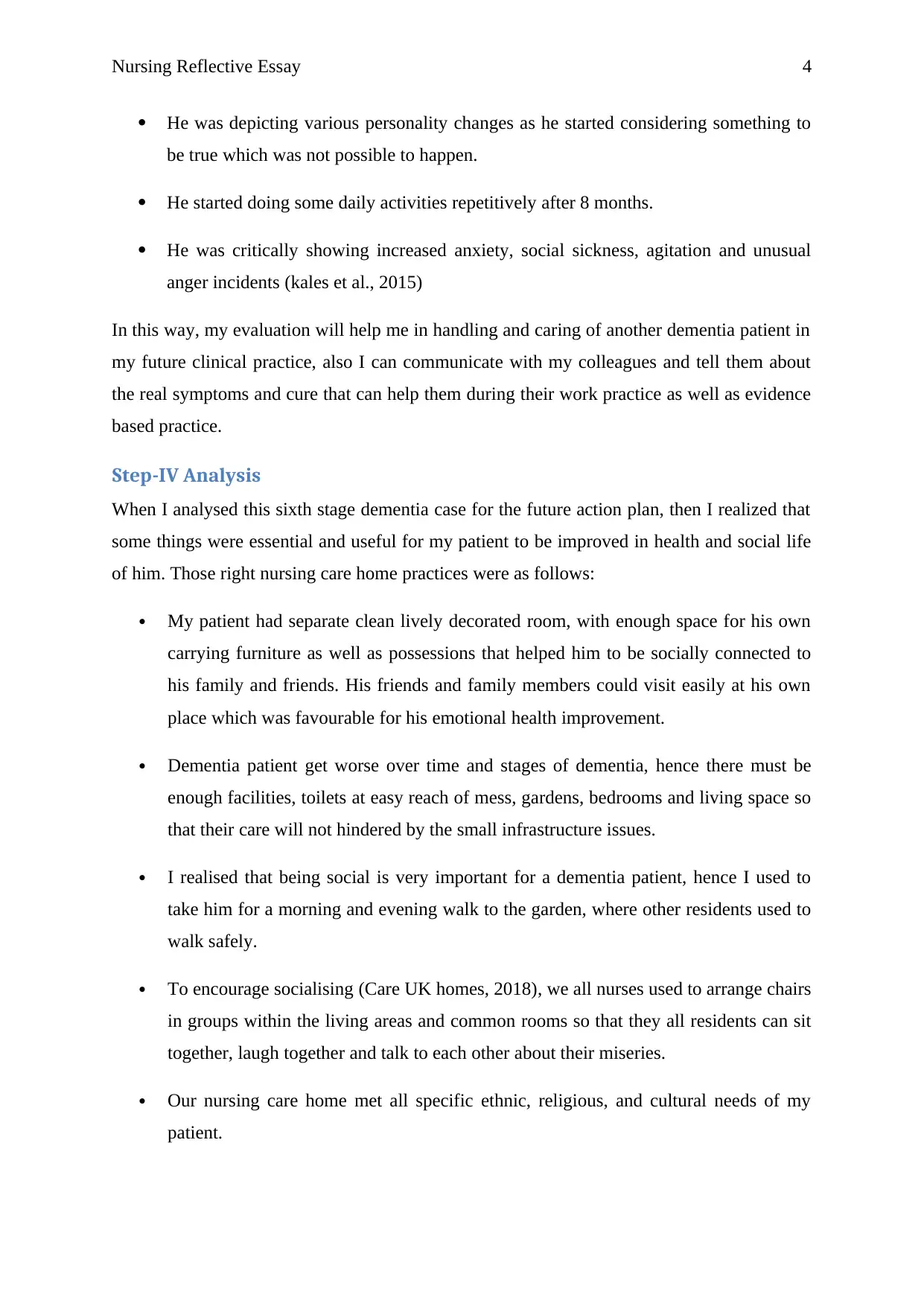
Nursing Reflective Essay 4
He was depicting various personality changes as he started considering something to
be true which was not possible to happen.
He started doing some daily activities repetitively after 8 months.
He was critically showing increased anxiety, social sickness, agitation and unusual
anger incidents (kales et al., 2015)
In this way, my evaluation will help me in handling and caring of another dementia patient in
my future clinical practice, also I can communicate with my colleagues and tell them about
the real symptoms and cure that can help them during their work practice as well as evidence
based practice.
Step-IV Analysis
When I analysed this sixth stage dementia case for the future action plan, then I realized that
some things were essential and useful for my patient to be improved in health and social life
of him. Those right nursing care home practices were as follows:
My patient had separate clean lively decorated room, with enough space for his own
carrying furniture as well as possessions that helped him to be socially connected to
his family and friends. His friends and family members could visit easily at his own
place which was favourable for his emotional health improvement.
Dementia patient get worse over time and stages of dementia, hence there must be
enough facilities, toilets at easy reach of mess, gardens, bedrooms and living space so
that their care will not hindered by the small infrastructure issues.
I realised that being social is very important for a dementia patient, hence I used to
take him for a morning and evening walk to the garden, where other residents used to
walk safely.
To encourage socialising (Care UK homes, 2018), we all nurses used to arrange chairs
in groups within the living areas and common rooms so that they all residents can sit
together, laugh together and talk to each other about their miseries.
Our nursing care home met all specific ethnic, religious, and cultural needs of my
patient.
He was depicting various personality changes as he started considering something to
be true which was not possible to happen.
He started doing some daily activities repetitively after 8 months.
He was critically showing increased anxiety, social sickness, agitation and unusual
anger incidents (kales et al., 2015)
In this way, my evaluation will help me in handling and caring of another dementia patient in
my future clinical practice, also I can communicate with my colleagues and tell them about
the real symptoms and cure that can help them during their work practice as well as evidence
based practice.
Step-IV Analysis
When I analysed this sixth stage dementia case for the future action plan, then I realized that
some things were essential and useful for my patient to be improved in health and social life
of him. Those right nursing care home practices were as follows:
My patient had separate clean lively decorated room, with enough space for his own
carrying furniture as well as possessions that helped him to be socially connected to
his family and friends. His friends and family members could visit easily at his own
place which was favourable for his emotional health improvement.
Dementia patient get worse over time and stages of dementia, hence there must be
enough facilities, toilets at easy reach of mess, gardens, bedrooms and living space so
that their care will not hindered by the small infrastructure issues.
I realised that being social is very important for a dementia patient, hence I used to
take him for a morning and evening walk to the garden, where other residents used to
walk safely.
To encourage socialising (Care UK homes, 2018), we all nurses used to arrange chairs
in groups within the living areas and common rooms so that they all residents can sit
together, laugh together and talk to each other about their miseries.
Our nursing care home met all specific ethnic, religious, and cultural needs of my
patient.
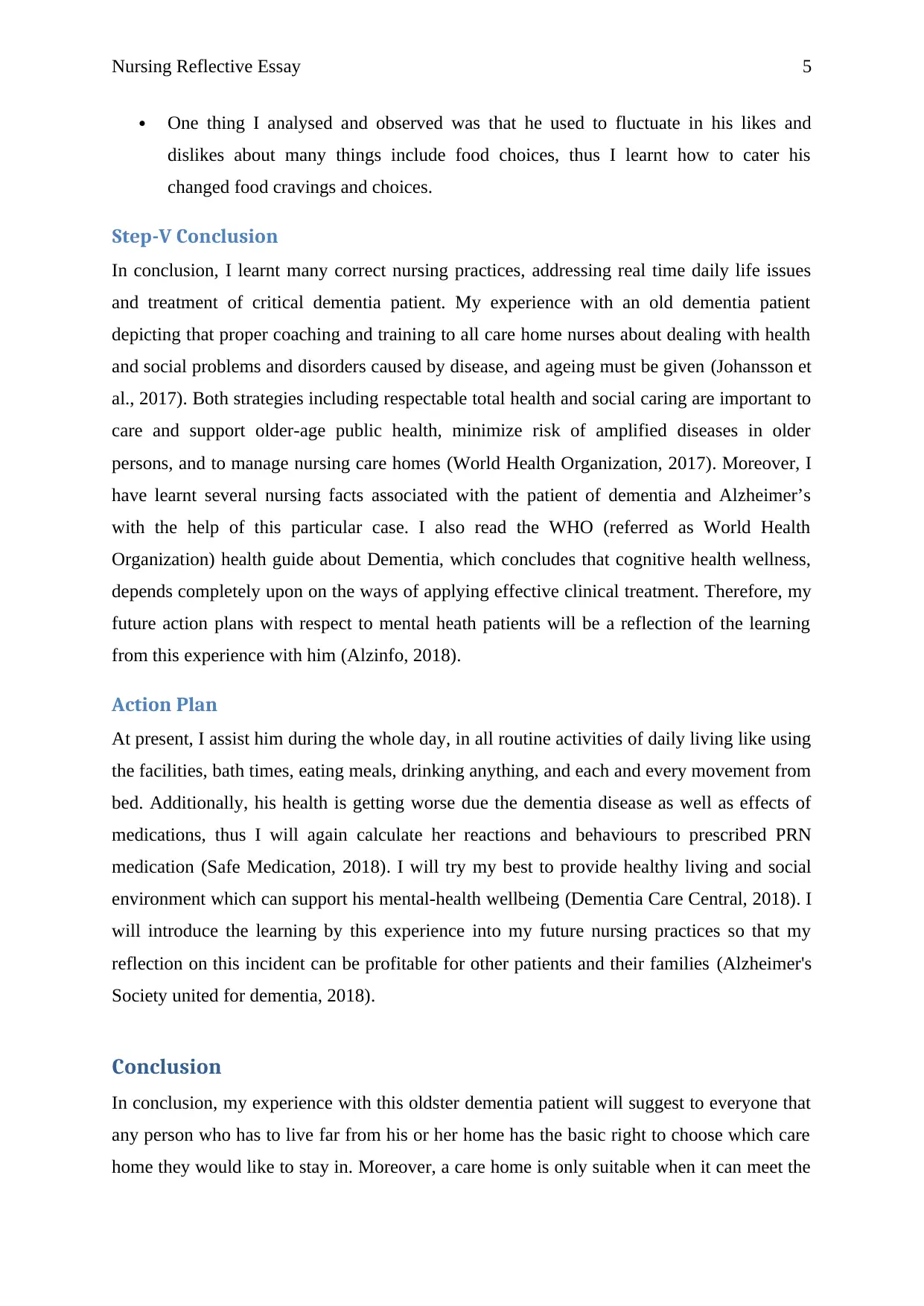
Nursing Reflective Essay 5
One thing I analysed and observed was that he used to fluctuate in his likes and
dislikes about many things include food choices, thus I learnt how to cater his
changed food cravings and choices.
Step-V Conclusion
In conclusion, I learnt many correct nursing practices, addressing real time daily life issues
and treatment of critical dementia patient. My experience with an old dementia patient
depicting that proper coaching and training to all care home nurses about dealing with health
and social problems and disorders caused by disease, and ageing must be given (Johansson et
al., 2017). Both strategies including respectable total health and social caring are important to
care and support older-age public health, minimize risk of amplified diseases in older
persons, and to manage nursing care homes (World Health Organization, 2017). Moreover, I
have learnt several nursing facts associated with the patient of dementia and Alzheimer’s
with the help of this particular case. I also read the WHO (referred as World Health
Organization) health guide about Dementia, which concludes that cognitive health wellness,
depends completely upon on the ways of applying effective clinical treatment. Therefore, my
future action plans with respect to mental heath patients will be a reflection of the learning
from this experience with him (Alzinfo, 2018).
Action Plan
At present, I assist him during the whole day, in all routine activities of daily living like using
the facilities, bath times, eating meals, drinking anything, and each and every movement from
bed. Additionally, his health is getting worse due the dementia disease as well as effects of
medications, thus I will again calculate her reactions and behaviours to prescribed PRN
medication (Safe Medication, 2018). I will try my best to provide healthy living and social
environment which can support his mental-health wellbeing (Dementia Care Central, 2018). I
will introduce the learning by this experience into my future nursing practices so that my
reflection on this incident can be profitable for other patients and their families (Alzheimer's
Society united for dementia, 2018).
Conclusion
In conclusion, my experience with this oldster dementia patient will suggest to everyone that
any person who has to live far from his or her home has the basic right to choose which care
home they would like to stay in. Moreover, a care home is only suitable when it can meet the
One thing I analysed and observed was that he used to fluctuate in his likes and
dislikes about many things include food choices, thus I learnt how to cater his
changed food cravings and choices.
Step-V Conclusion
In conclusion, I learnt many correct nursing practices, addressing real time daily life issues
and treatment of critical dementia patient. My experience with an old dementia patient
depicting that proper coaching and training to all care home nurses about dealing with health
and social problems and disorders caused by disease, and ageing must be given (Johansson et
al., 2017). Both strategies including respectable total health and social caring are important to
care and support older-age public health, minimize risk of amplified diseases in older
persons, and to manage nursing care homes (World Health Organization, 2017). Moreover, I
have learnt several nursing facts associated with the patient of dementia and Alzheimer’s
with the help of this particular case. I also read the WHO (referred as World Health
Organization) health guide about Dementia, which concludes that cognitive health wellness,
depends completely upon on the ways of applying effective clinical treatment. Therefore, my
future action plans with respect to mental heath patients will be a reflection of the learning
from this experience with him (Alzinfo, 2018).
Action Plan
At present, I assist him during the whole day, in all routine activities of daily living like using
the facilities, bath times, eating meals, drinking anything, and each and every movement from
bed. Additionally, his health is getting worse due the dementia disease as well as effects of
medications, thus I will again calculate her reactions and behaviours to prescribed PRN
medication (Safe Medication, 2018). I will try my best to provide healthy living and social
environment which can support his mental-health wellbeing (Dementia Care Central, 2018). I
will introduce the learning by this experience into my future nursing practices so that my
reflection on this incident can be profitable for other patients and their families (Alzheimer's
Society united for dementia, 2018).
Conclusion
In conclusion, my experience with this oldster dementia patient will suggest to everyone that
any person who has to live far from his or her home has the basic right to choose which care
home they would like to stay in. Moreover, a care home is only suitable when it can meet the
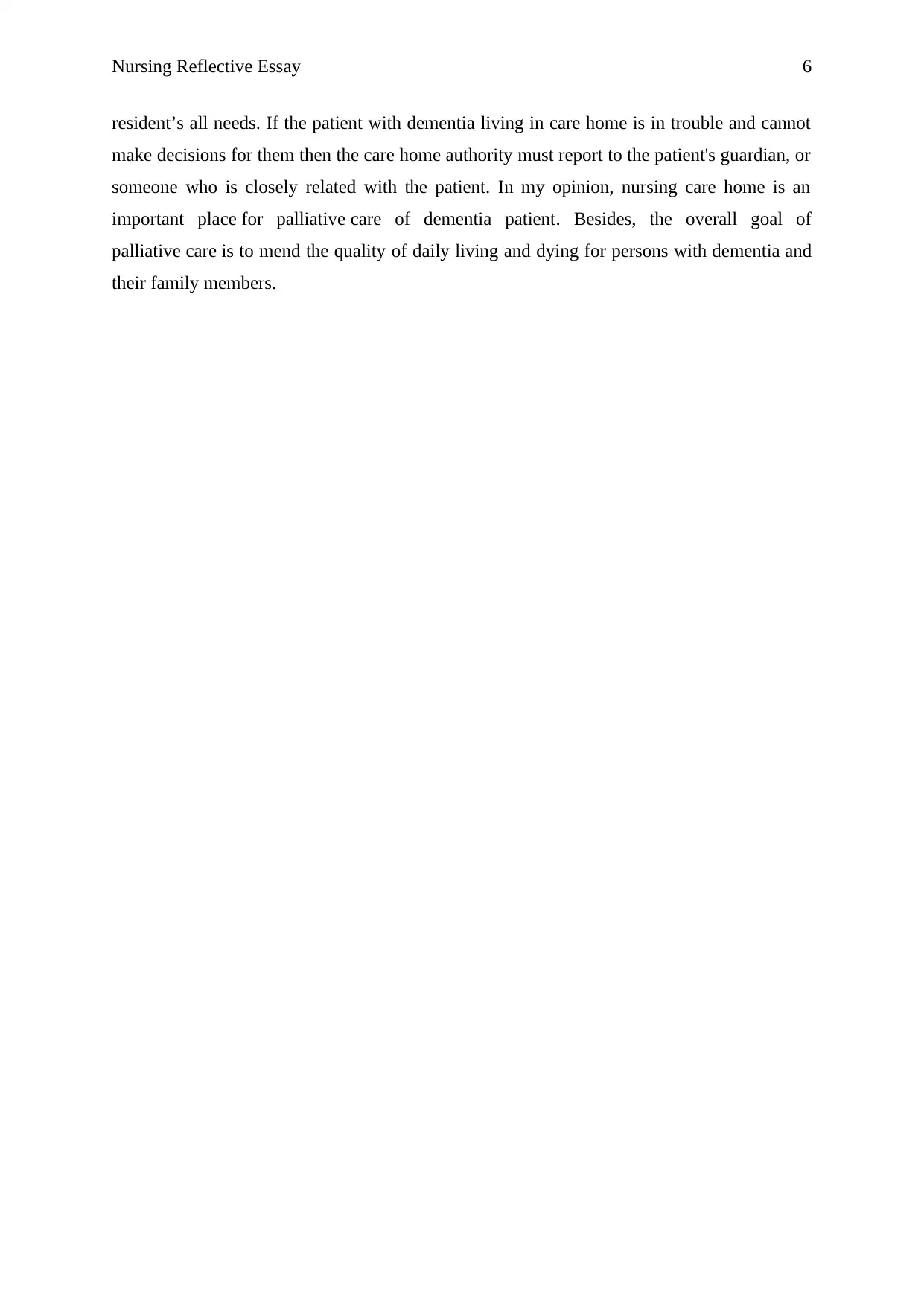
Nursing Reflective Essay 6
resident’s all needs. If the patient with dementia living in care home is in trouble and cannot
make decisions for them then the care home authority must report to the patient's guardian, or
someone who is closely related with the patient. In my opinion, nursing care home is an
important place for palliative care of dementia patient. Besides, the overall goal of
palliative care is to mend the quality of daily living and dying for persons with dementia and
their family members.
resident’s all needs. If the patient with dementia living in care home is in trouble and cannot
make decisions for them then the care home authority must report to the patient's guardian, or
someone who is closely related with the patient. In my opinion, nursing care home is an
important place for palliative care of dementia patient. Besides, the overall goal of
palliative care is to mend the quality of daily living and dying for persons with dementia and
their family members.
Paraphrase This Document
Need a fresh take? Get an instant paraphrase of this document with our AI Paraphraser
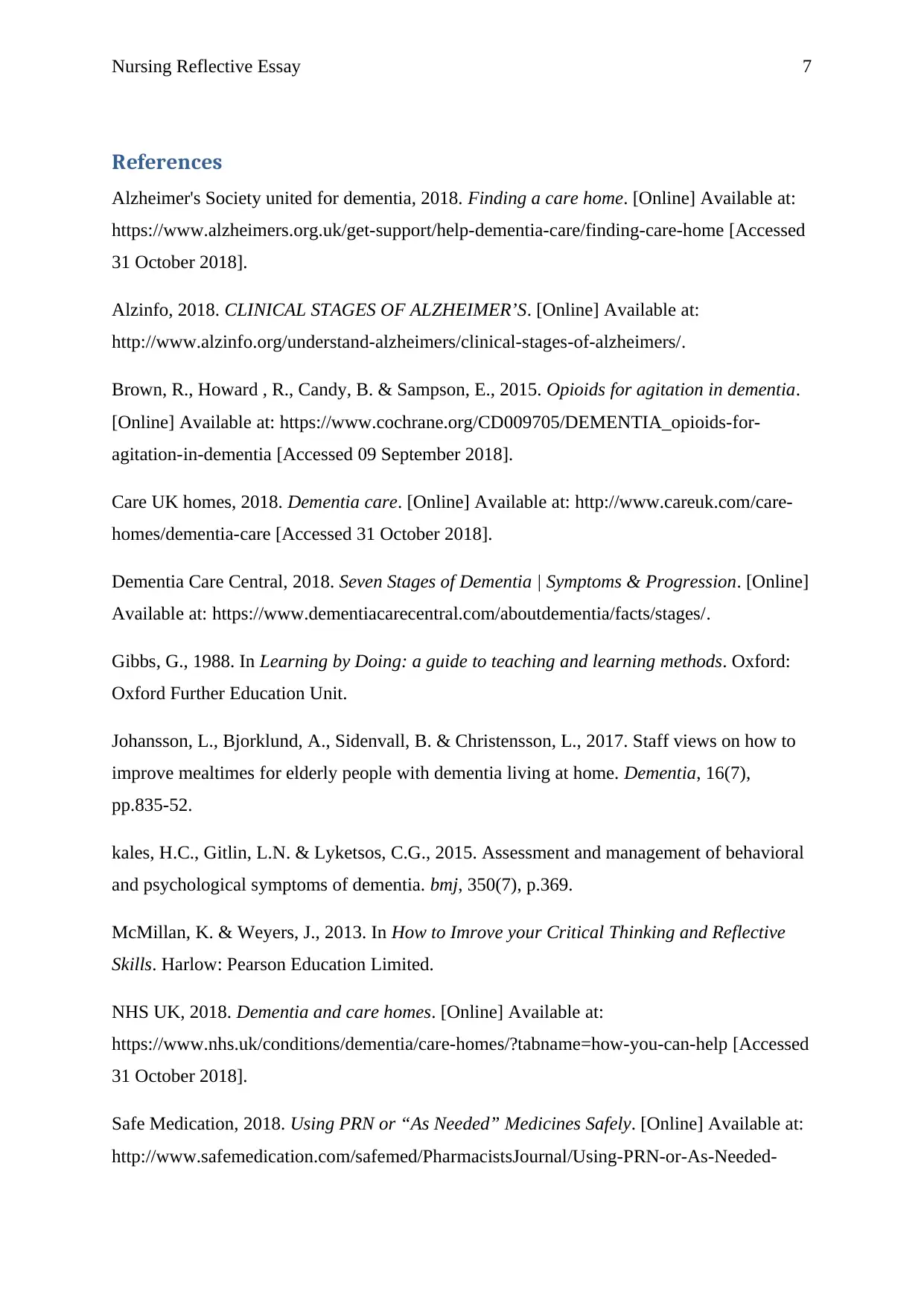
Nursing Reflective Essay 7
References
Alzheimer's Society united for dementia, 2018. Finding a care home. [Online] Available at:
https://www.alzheimers.org.uk/get-support/help-dementia-care/finding-care-home [Accessed
31 October 2018].
Alzinfo, 2018. CLINICAL STAGES OF ALZHEIMER’S. [Online] Available at:
http://www.alzinfo.org/understand-alzheimers/clinical-stages-of-alzheimers/.
Brown, R., Howard , R., Candy, B. & Sampson, E., 2015. Opioids for agitation in dementia.
[Online] Available at: https://www.cochrane.org/CD009705/DEMENTIA_opioids-for-
agitation-in-dementia [Accessed 09 September 2018].
Care UK homes, 2018. Dementia care. [Online] Available at: http://www.careuk.com/care-
homes/dementia-care [Accessed 31 October 2018].
Dementia Care Central, 2018. Seven Stages of Dementia | Symptoms & Progression. [Online]
Available at: https://www.dementiacarecentral.com/aboutdementia/facts/stages/.
Gibbs, G., 1988. In Learning by Doing: a guide to teaching and learning methods. Oxford:
Oxford Further Education Unit.
Johansson, L., Bjorklund, A., Sidenvall, B. & Christensson, L., 2017. Staff views on how to
improve mealtimes for elderly people with dementia living at home. Dementia, 16(7),
pp.835-52.
kales, H.C., Gitlin, L.N. & Lyketsos, C.G., 2015. Assessment and management of behavioral
and psychological symptoms of dementia. bmj, 350(7), p.369.
McMillan, K. & Weyers, J., 2013. In How to Imrove your Critical Thinking and Reflective
Skills. Harlow: Pearson Education Limited.
NHS UK, 2018. Dementia and care homes. [Online] Available at:
https://www.nhs.uk/conditions/dementia/care-homes/?tabname=how-you-can-help [Accessed
31 October 2018].
Safe Medication, 2018. Using PRN or “As Needed” Medicines Safely. [Online] Available at:
http://www.safemedication.com/safemed/PharmacistsJournal/Using-PRN-or-As-Needed-
References
Alzheimer's Society united for dementia, 2018. Finding a care home. [Online] Available at:
https://www.alzheimers.org.uk/get-support/help-dementia-care/finding-care-home [Accessed
31 October 2018].
Alzinfo, 2018. CLINICAL STAGES OF ALZHEIMER’S. [Online] Available at:
http://www.alzinfo.org/understand-alzheimers/clinical-stages-of-alzheimers/.
Brown, R., Howard , R., Candy, B. & Sampson, E., 2015. Opioids for agitation in dementia.
[Online] Available at: https://www.cochrane.org/CD009705/DEMENTIA_opioids-for-
agitation-in-dementia [Accessed 09 September 2018].
Care UK homes, 2018. Dementia care. [Online] Available at: http://www.careuk.com/care-
homes/dementia-care [Accessed 31 October 2018].
Dementia Care Central, 2018. Seven Stages of Dementia | Symptoms & Progression. [Online]
Available at: https://www.dementiacarecentral.com/aboutdementia/facts/stages/.
Gibbs, G., 1988. In Learning by Doing: a guide to teaching and learning methods. Oxford:
Oxford Further Education Unit.
Johansson, L., Bjorklund, A., Sidenvall, B. & Christensson, L., 2017. Staff views on how to
improve mealtimes for elderly people with dementia living at home. Dementia, 16(7),
pp.835-52.
kales, H.C., Gitlin, L.N. & Lyketsos, C.G., 2015. Assessment and management of behavioral
and psychological symptoms of dementia. bmj, 350(7), p.369.
McMillan, K. & Weyers, J., 2013. In How to Imrove your Critical Thinking and Reflective
Skills. Harlow: Pearson Education Limited.
NHS UK, 2018. Dementia and care homes. [Online] Available at:
https://www.nhs.uk/conditions/dementia/care-homes/?tabname=how-you-can-help [Accessed
31 October 2018].
Safe Medication, 2018. Using PRN or “As Needed” Medicines Safely. [Online] Available at:
http://www.safemedication.com/safemed/PharmacistsJournal/Using-PRN-or-As-Needed-

Nursing Reflective Essay 8
Medicines-Safely [Accessed 09 September 2018].
World Health Organization, 2017. Dementia. [Online] Available at:
http://www.who.int/news-room/fact-sheets/detail/dementia.
Medicines-Safely [Accessed 09 September 2018].
World Health Organization, 2017. Dementia. [Online] Available at:
http://www.who.int/news-room/fact-sheets/detail/dementia.
1 out of 9
Related Documents
Your All-in-One AI-Powered Toolkit for Academic Success.
+13062052269
info@desklib.com
Available 24*7 on WhatsApp / Email
![[object Object]](/_next/static/media/star-bottom.7253800d.svg)
Unlock your academic potential
© 2024 | Zucol Services PVT LTD | All rights reserved.





